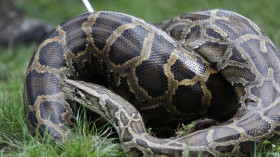Roundworms have long been known by scientists to have short memories. It is for this reason that these nematodes frequently forget new information in just a span of two to three hours after acquiring or learning it. This fact is evident since worms have smaller brains, unlike larger animals such as mammals like humans that can store and remember memories for a longer period of time.
However, in a recent scientific breakthrough, roundworms can have a memory boost, making them "stop forgetting" as observed by scientists. According to a study led by researchers from the United States, the roundworm Caenorhabditis elegans can retain their memories if they are frozen or put on ice, where their bodies cool down quickly. This also happens when they are given the drug lithium.
Roundworms Stop Forgetting
![Roundworms with Short Memories 'Stop Forgetting' When Frozen or Given Lithium [Study] Roundworms with Short Memories 'Stop Forgetting' When Frozen or Given Lithium [Study]](https://1471793142.rsc.cdn77.org/data/images/full/70295/roundworms-with-short-memories-stop-forgetting-when-frozen-or-given-lithium-study.jpg?w=820)
(Photo : Photo by Sean Thomas on Unsplash)
Findings about roundworms stop forgetting when frozen or given lithium was published in the journal bioRxiv earlier this month. The research paper, posted on the pre-print server website, was led by geneticist Oded Rechavi from the Tel Aviv University in Israel. The study used C. elegans as a model organism to determine if science can freeze the memory of a roundworm.
The cognitive function 'memory' has remained a mystery to science until now. Even experts are not entirely certain as to how this function formed in the first place or how the brain stores and eventually loses some or all encoded information. While memories are evident among humans, animals ranging from the largest to the smallest are also capable of this cognitive trait.
In the Tel Aviv University study, researchers focused on olfactory memories in roundworms and found that forgetting this stimulus can be delayed through cold temperatures and druggable mechanism. By choosing animals with a short-term memory, the research team selected C. elegans nematodes as a subject that forms associative memories but forgets them quickly.
Also Read: Prehistoric Worms Come Back To Life After 42,000 Years Of Being Frozen
Cold Temperature and Lithium
The said roundworms only have 302 neurons and this is the reason why they have short-term memories. Yet, the paper suggests that the invertebrates' memories are preserved when the worm is on ice and exposed to lithium salt. The team discovered that the "worms delay forgetting specific olfactory memories by at least 8-fold." Still, this current state is not yet proven to be permanent.
In the past, cold temperatures (under controlled procedures) have been proven to slow down body functions, including heart rate and other organs. In humans, extreme cold temperature can lead to hypothermia which can cause heart and respiratory systems to fail and lead to death, according to Mayo Clinic. However, there is no evidence that low temperatures can delay memory loss.
Nevertheless, in recent years, there is growing evidence suggesting that some animals can remember. According to the website Whole Dog Journal, most researchers assert that dogs possess long-term memories that can remember significant people and events in their lives, even for years and potentially until their deaths.
Related Article: Medieval Period Augustinian Monks had More Intestinal Worms Despite Clean Monasteries
© 2024 NatureWorldNews.com All rights reserved. Do not reproduce without permission.


![Plastic Pollution: Scientists Include Spores of Plastic-Eating Bacteria ‘Bacillus Subtilis’ to Develop 'Self-Digesting Plastic' [Study]](https://1471793142.rsc.cdn77.org/data/thumbs/full/70396/280/157/50/40/plastic-pollution-scientists-include-spores-of-plastic-eating-bacteria-bacillus-subtilis-to-develop-self-digesting-plastic-study.jpg)


